CDC Updates Pediatric Immunization Schedule, Including COVID Vaccine
The CDC updated its 2023 pediatric immunization schedule to include recommendations for the COVID-19 vaccine starting at six months old.

Source: Getty Images
- In a 2023 update to the recommended pediatric immunization schedule, the CDC has included recommendations for the COVID-19 vaccine starting at six months. While these guidelines do not force or mandate vaccination, pediatric immunization schedules are often used, recommended, and closely followed by pediatric healthcare workers. The updated suggestions may help guide new parents throughout the vaccination process or sway those who have yet to vaccinate their children toward vaccination.
The new schedule specifies that children between six months and four years should receive a primary vaccination series consisting of the appropriate dose of the Moderna vaccine, 25 mcg/0.25 mL, and a second dose in the primary series given 4–8 weeks after the initial dose. Alternatively, this patient population may get a three-dose series of the Pfizer vaccine (3 mcg/2 mL), including an initial dose, one at 3–8 weeks, and one at 11–16 weeks.
The recommended primary vaccination series for ages 5–11 and 12–18 is the same: two doses of the Moderna vaccine given 4–8 weeks apart or two doses of the Pfizer vaccine given 3–8 weeks apart. However, for ages 5–11, each Moderna dose is 50 mcg/0.5 mL, and each Pfizer dose is 10 mcg/0.2 mL. Additionally, for ages 12 and older, the Pfizer dose is 30 mcg/ 0.3 mL, and the Moderna dose is 100 mcg/ 0.5 mL.
In addition to the primary series, the CDC is recommending bivalent boosters for eligible pediatric populations. Moderna bivalent boosters are available for patients six months and older in the following doses: 10 mcg/0.2 mL for those six months to five years old, 25 mcg/25 mL for 6–11 years, and 50 mcg/0.5 mL for 12 and older. Pfizer bivalent boosters are available at 10 mcg/0.2 mL for patients 5–11 and 30 mcg/0.3 mL for anyone over 12.
These recommendations also acknowledge special situations and contraindications to consider before vaccination. For example, immunocompromised patients have a different recommended vaccination series. In addition, patients with severe allergic reactions to vaccine components may not be eligible for vaccination.
COVID-19 vaccinations have been a critical public health tool for addressing the pandemic. In addition to preventing over three million deaths, vaccines have minimized the rates of severe infection, disease spread, long-COVID, and other complications. Vaccination remains an essential tool as the United States navigates through the pandemic and battles other viral illnesses. Providers are encouraged to provide vaccine education to patients and their parents. Parents concerned about vaccination may refer to their child’s provider or the CDC website.
